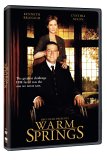| Reviews & Columns |
|
Reviews DVD TV on DVD Blu-ray 4K UHD International DVDs In Theaters Reviews by Studio Video Games Features Collector Series DVDs Easter Egg Database Interviews DVD Talk Radio Feature Articles Columns Anime Talk DVD Savant Horror DVDs The M.O.D. Squad Art House HD Talk Silent DVD
|
DVD Talk Forum |
|
|
| Resources |
|
DVD Price Search Customer Service #'s RCE Info Links |
|
Columns
|
|
|
Warm Springs
HBO // Unrated // August 30, 2005
List Price: $26.98 [Buy now and save at Amazon]
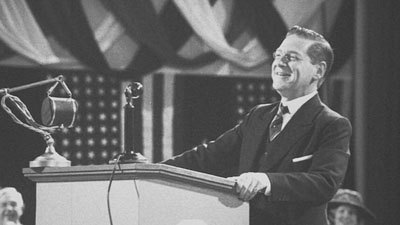 I should start this off with an admission: I don't think I've ever disliked Kenneth Branagh in a film. He's a real actor's actor, molding himself into every role he takes on, whether that's as the goofy, self-obsessed Professor Gilderoy Lockhart in Harry Potter and the Chamber of Secrets or in his career-defining role as Hamlet. But had someone said to me, "We need someone to play Franklin Delano Roosevelt," I have a hard time envisioning a scenario where I or anyone else would immediately shout, "Kenneth Branagh! He would be perfect for the role!" A British actor isn't the first person that comes to mind to portray a man widely regarded as the greatest American president of the 20th century, after all. Likewise, I wouldn't have imagined Cynthia Nixon ("Sex and the City") as Eleanor, the staunch human rights activist and Roosevelt's lifelong partner. Maybe that's why I'm not a casting director. Regardless, the two of them do a really remarkable job as the former president and first lady, portraying their historical counterparts' mannerisms and zeal for life beautifully. Nixon, in particular, looks and sounds quite a bit like Eleanor – dowdied up, of course.
I should start this off with an admission: I don't think I've ever disliked Kenneth Branagh in a film. He's a real actor's actor, molding himself into every role he takes on, whether that's as the goofy, self-obsessed Professor Gilderoy Lockhart in Harry Potter and the Chamber of Secrets or in his career-defining role as Hamlet. But had someone said to me, "We need someone to play Franklin Delano Roosevelt," I have a hard time envisioning a scenario where I or anyone else would immediately shout, "Kenneth Branagh! He would be perfect for the role!" A British actor isn't the first person that comes to mind to portray a man widely regarded as the greatest American president of the 20th century, after all. Likewise, I wouldn't have imagined Cynthia Nixon ("Sex and the City") as Eleanor, the staunch human rights activist and Roosevelt's lifelong partner. Maybe that's why I'm not a casting director. Regardless, the two of them do a really remarkable job as the former president and first lady, portraying their historical counterparts' mannerisms and zeal for life beautifully. Nixon, in particular, looks and sounds quite a bit like Eleanor – dowdied up, of course.The film (directed by Joseph Sargent with a fantastic screenplay by first-time screenwriter Margaret Nagle) aired earlier this year on HBO, just after the 60th anniversary of Roosevelt's passing. It's a look at Roosevelt's formative days, after his stint as Secretary of the Navy and prior to his first campaign for governor of New York. It was during this period of time that Roosevelt's priorities and motivations changed in the aftermath of a crippling virus, shaping him to be the man history remembers: a champion of the poor, a stalwart defender of freedom.
FDR was born a son of privilege, and an only child. Because of his family's large fortune (made by his grandfather in China from the opium trade), he never would have had to work a day in his life, were he so inclined. But he wanted to make a name for himself in politics, even though his grasp of the meaning of the word was tenuous at best:
"Franklin, why are you a Democrat?"
"The Democratic Party is the party of the people, and I'm a man of the people."
"You're a Roosevelt. Since when does a Roosevelt know about people?"
It's at this point that the film begins. Superficial and thoughtless towards nearly everyone but himself, Franklin has glided more or less effortlessly though life. Political opponents joke that FDR stands for "feather duster"; he's a lightweight, with no knowledge or interest in the struggles of the working class. And despite having a wife and five children, he gives no thought to having an
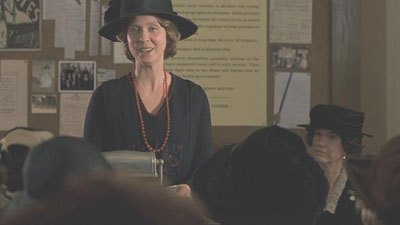 affair with his secretary, shrugging off the warnings of his political guide, Louis Howe (David Paymer).
affair with his secretary, shrugging off the warnings of his political guide, Louis Howe (David Paymer).When Eleanor is eventually forced to confront the truth, though, his marriage is shattered and it's only due to his promising political career that the two stay together. But that promise is taken away shortly thereafter when, during a photo opportunity at a Boy Scout camp, he contracts infantile paralysis – better known now as polio. It's a monumental blow to everyone who knows him. In the span of a few days' time, Franklin is reduced from an active, 39-year-old man who wrestles with his kids to a depressed, wheelchair-bound cripple. In despair, he retires from the world and his family and lives in a docked boat, struggling to regain the strength in his legs through swimming and continually failing to do so. Eventually, he hears of a miracle in the newspaper – a place where a boy with polio was able to walk again. It's called Warm Springs, and Roosevelt immediately sets off to go there.
Located in the segregated Deep South, Warm Springs is hardly what Franklin envisions. Rundown, shabby, and suffering from years of neglect, it hardly seems like the place where a miracle of any kind could happen. But it's here at Warm Springs that he is given hope again that he may one day walk unassisted, encouraged by the owner, Tom Loyless (a fantastic Tim Blake Nelson), and a physical therapist, Helena Mahoney (Kathy Bates).
FDR never gets his miracle, we know in retrospect, but his entire outlook on life undergoes a radical transformation during this time, as it's here that he is first confronted by America's truly poor. Often, those are victims of polio, who are not only feared and reviled by the general public but must use up all their money in treatment. In one dramatic scene, a young man with the disease is forced to ride the entire way from Atlanta to Warm Springs in the baggage car in the blistering summer heat, despite buying a regular ticket. He arrives nearly dead, collapsed on the floor. Furious, FDR attacks the conductor, throwing him to the ground from his wheelchair and screaming obscenities at him. The young man later recovers – Franklin nurses him back to health personally.
In the end, Franklin gains something that no other experience could have given him: empathy. And in fighting for himself and others, he finally finds a reason to run for office that extends past his own personal ambition. At the 1924 Democratic convention that closes the film, a reporter comes up to Eleanor as she's seated, watching the crowd cheer her husband's message of hope and optimism for over an hour. "Mrs. Roosevelt, do you think polio has affected your husband's mind?" he asks.
Eleanor pauses briefly, then beams. "I do. I most certainly do."
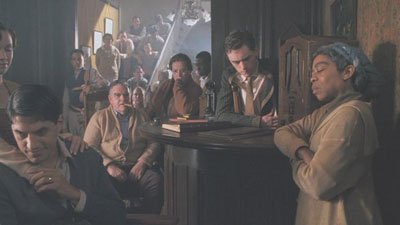 Video:
Video:Like nearly all HBO releases, Warm Springs' transfer is bright, clear, and clean. The overall tone of the movie is warm – after all, most of the movie is set in Georgia. It's presented in 1.78:1 anamorphic.
Audio:
The English 5.1 surround is crisp, but naturally doesn't make much use of the rear speakers or the subwoofer – there's not a huge difference between it and the English 2.0 option, to be honest. A Spanish 2.0 dub is also available, along with English, French, and Spanish subtitles. The music is what you would expect – pianos, strings – but thankfully doesn't overwhelm the film with forced emotion.
Extras:
The main extra on the disc is the audio commentary by director Joseph Sargent and writer Margaret Nagle. I almost always like commentaries with the writers, as they seem to have the most insight into the creation of scenes and differences from the source material (in this case, pointing out where she diverged from history with certain lines or used her best judgment for a scene based on the available evidence). Nagle talks about the origin of the script being her desire to combine history with the difficulties that disabled people (her wheelchair-bound brother, in particular) encounter on a daily basis, and also mentions that the movie was filmed in Warm Springs, Georgia. Sargent discusses his idolization of Roosevelt and how the script he was given presented his hero in a very different light than he expected throughout much of it. Also mentioned are the use of prosthetics and CGI to make Branagh's legs appear severely atrophied – the prosthetic legs in particular look so real that the first time I saw them I thought they were.
Three deleted scenes are included, with chapter stops: a "normal life" scene at Warm Springs, a late-night conversation between Jake Perini (Andrew Davoli) and FDR, and a scene of the presidential inauguration. As Nagle in the commentary says, the last deleted scene seems like a second ending. I'm inclined to agree.
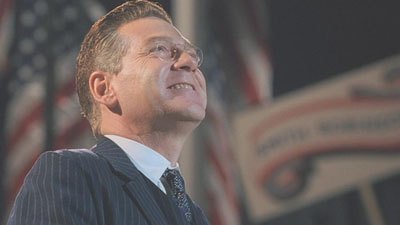 Finally, a three-and-a-half-minute "behind the scenes" promo gives the actors a few seconds to discuss their characters between short scenes from the movie.
Finally, a three-and-a-half-minute "behind the scenes" promo gives the actors a few seconds to discuss their characters between short scenes from the movie.Conclusion:
Warm Springs could have been a sappy and vapid Hallmark-style film were it not for an excellent screenplay and inspired performances by Branagh, Nixon, and the rest of the cast. It excels in the tradition of other great HBO biopics. Highly recommended.
|
| Popular Reviews |
| Sponsored Links |
|
|
| Sponsored Links |
|
|
| Release List | Reviews | Shop | Newsletter | Forum | DVD Giveaways | Blu-Ray | Advertise |
|
Copyright 2024 DVDTalk.com All Rights Reserved. Legal Info, Privacy Policy, Terms of Use,
Manage Preferences,
Your Privacy Choices | |||||||









